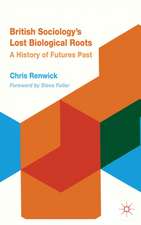Piracy: The Intellectual Property Wars from Gutenberg to Gates
Autor Adrian Johnsen Limba Engleză Paperback – 30 apr 2011
Piracy explores the intellectual property wars from the advent of print culture in the fifteenth century to the reign of the Internet in the twenty-first. Brimming with broader implications for today’s debates over open access, fair use, free culture, and the like, Johns’s book ultimately argues that piracy has always stood at the center of our attempts to reconcile creativity and commerce—and that piracy has been an engine of social, technological, and intellectual innovations as often as it has been their adversary. From Cervantes to Sonny Bono, from Maria Callas to Microsoft, from Grub Street to Google, no chapter in the story of piracy evades Johns’s graceful analysis in what will be the definitive history of the subject for years to come.
Preț: 211.44 lei
Nou
Puncte Express: 317
Preț estimativ în valută:
40.46€ • 41.97$ • 33.74£
40.46€ • 41.97$ • 33.74£
Carte tipărită la comandă
Livrare economică 27 martie-10 aprilie
Preluare comenzi: 021 569.72.76
Specificații
ISBN-13: 9780226401195
ISBN-10: 0226401197
Pagini: 640
Ilustrații: 40 halftones
Dimensiuni: 152 x 229 x 36 mm
Greutate: 0.85 kg
Ediția:First Edition
Editura: University of Chicago Press
Colecția University of Chicago Press
ISBN-10: 0226401197
Pagini: 640
Ilustrații: 40 halftones
Dimensiuni: 152 x 229 x 36 mm
Greutate: 0.85 kg
Ediția:First Edition
Editura: University of Chicago Press
Colecția University of Chicago Press
Notă biografică
Adrian Johns is professor of history and chair of the Committee on Conceptual and Historical Studies of Science at the University of Chicago. He is the author of The Nature of the Book: Print and Knowledge in the Making, also published by the University of Chicago Press.
Cuprins
1. A General History of the Pirates
2. The Invention of Piracy
3. The Piratical Enlightenment
4. Experimenting with Print
5. Pharmaceutical Piracy and the Origins of Medical Patenting
6. Of Epics and Orreries
7. The Land without Property
8. Making a Nation
9. The Printing Counterrevolution
10. Inventors, Schemers, and Men of Science
11. International Copyright and the Science of Civilization
12. The First Pirate Hunters
13. The Great Oscillation War
14. Intellectual Property and the Nature of Science
15. The Pirate at Home and at Large
16. From Phreaking to Fudding
17. Past, Present, and Future
Acknowledgments
Notes
Index
2. The Invention of Piracy
3. The Piratical Enlightenment
4. Experimenting with Print
5. Pharmaceutical Piracy and the Origins of Medical Patenting
6. Of Epics and Orreries
7. The Land without Property
8. Making a Nation
9. The Printing Counterrevolution
10. Inventors, Schemers, and Men of Science
11. International Copyright and the Science of Civilization
12. The First Pirate Hunters
13. The Great Oscillation War
14. Intellectual Property and the Nature of Science
15. The Pirate at Home and at Large
16. From Phreaking to Fudding
17. Past, Present, and Future
Acknowledgments
Notes
Index
Recenzii
"In his invaluable book Piracy, Adrian Johns argues that the tendency of intellectual property battles to undermine privacy is not new. On the contrary, Johns . . . argues that ever since the medieval and Enlightenment eras, corporations have tried to defend their economic interests by searching for intellectual piracy in the private sphere of people's homes. He says that all of our current debates about intellectual piracy—from Google's efforts to create a universal digital library to the fight over how vigorous patents should be—have antecedents in the copyright wars of earlier eras."
“It’s easy to assume, amid all the brouhaha about intellectual property, illegal downloading, and the internet in general, that the question of piracy was born with the web browser. But as long as there have been ideas, people have been accused of stealing them. In this detail-packed biography of fakery, science historian Johns describes one of the earliest attempts to protect authors’ rights—a vellum-bound book registry in the Stationer’s Hall in seventeenth-century London—and examines everything from the Victorian crusade against the patent, to the radio pirates of the 1920s, to the telephone phreakers of the 1970s and the computer hackers of today. Piracy is not new, he concludes, but we are due for a revolution in intellectual property, and science may be its ideal breeding ground.”
“While the rise of the Internet has given it new dimensions, the concept of intellectual piracy has existed for centuries, and the disputes of previous eras have much in common with those of our own time. In a new book, Piracy, Johns details the long history of the term and its battles, arguing that those who would shape the future of intellectual property should first understand its past.”
“Johns makes a bold claim: disputes over intellectual piracy have touched on so many crucial issues of creativity and commerce, identity and invention, science and society, that tracing them amounts to ‘a history of modernity from askance.’ . . . More generally, Piracy shows us how the very notion of intellectual property—and its sharp division into the fields of patent and copyright—was created in response to specific pressures and so could be modified dramatically or even abolished. . . . ‘We are constantly trying to shoehorn problems into an intellectual framework designed 150 years ago in a different world.’”
"Adrian Johns argues that piracy is a cultural force that has driven the development of intellectual-property law, politics, and practices. As copying technologies have advanced, from the invention of printing in the sixteenth century to the present, acts of piracy have shaped endeavours from scientific publishing to pharmaceuticals and software. . . . Johns suggests, counter-intuitively, that piracy can promote the development of technology. The resulting competition forces legitimate innovators to manoeuvre for advantage—by moving quickly, using technical countermeasures or banding together and promoting reputation as an indicator of quality, such as through trademarks. . . . The exclusive rights granted by intellectual-property laws are always being reshaped by public opinion, and accused pirates have lobbied against these laws for centuries."
“Johns’s research stands as an important reminder that today’s intellectual property crises are not unprecedented, and offers a survey of potential approaches to a solution.”
2010 Outstanding Academic Title








